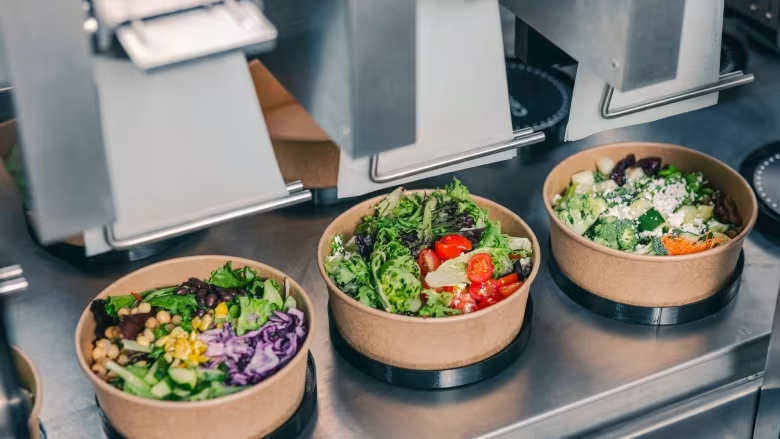
Remy is a food robot that preps salads, designed by Vancouver robotics company Cibotica. The adoption of automation is growing in the restaurant sector as companies look to cut labour costs and improve efficiency. (Cibotica)
In recent years, the fast-food industry has witnessed a significant shift towards automation, with robots increasingly replacing human workers in various kitchen roles. This transformation is driven by a dual objective of reducing labor costs and enhancing operational efficiency, a trend evident in establishments like Food Republic in Vancouver.
At Food Republic, an innovative robotic system named Remy is revolutionizing the salad preparation process. Developed by the Canadian robotics startup Cibotica, Remy operates as an automated assembly line, utilizing artificial intelligence and machine learning. This giant stainless steel box efficiently portions out salad ingredients with precision, producing up to 300 salads per hour. According to Ashkan Mirnabavi, Cibotica's co-founder, Remy not only ensures consistency in food preparation but also significantly reduces customer wait times and labor costs by an impressive 33 percent.
Remy is part of a broader trend where major fast-food chains are incorporating automation solutions into their kitchens. Facing challenges such as staff shortages and rising labor costs, companies are turning to robots like Flippy for burger flipping, Chippy for frying french fries, and other specialized machines for diverse tasks.
The ongoing pandemic has further accelerated the adoption of automation in response to the reluctance of individuals to take on demanding roles in the fast-paced restaurant sector. A report from the Canadian Centre for Policy Alternatives reveals that by 2021, over 250,000 restaurant workers had left the industry in pursuit of alternative careers.
Recognizing the need for solutions, companies are exploring automation to address both the staff shortage and escalating labor costs. Domino's is testing a pizza-making machine in Berlin, White Castle has introduced mechanical arms for burger flipping and fry cooking, and some McDonald's locations are piloting robot servers. Sweetgreen, an American salad outlet, has even announced plans to fully automate all its locations within the next five years.
Chipotle Mexican Grill is among the companies actively experimenting with automation. The introduction of the Autocado, a machine designed to cut, core, and scoop avocados, exemplifies their commitment to improving efficiency. Curt Garner, Chipotle's Chief Technology Officer, highlights that machines like Autocado allow workers to focus on more complex and less repetitive tasks, leading to increased productivity.
While the initial costs of these technologies are high, fast-food chains are recognizing the long-term benefits, including the ability of machines to work continuously without breaks or sick leave. Although automation is on the rise, industry experts, such as Dr. Robin Yap, a professor of management at George Brown College, emphasize the importance of employers planning for employee retraining. Yap suggests that human workers could transition to more customer-facing roles, managerial positions, or even become technicians for the maintenance of these machines.
As the fast-food industry undergoes a paradigm shift towards automation, it remains to be seen how this transformation will impact the workforce and whether employees will adapt to the changing landscape of their roles in the industry.















